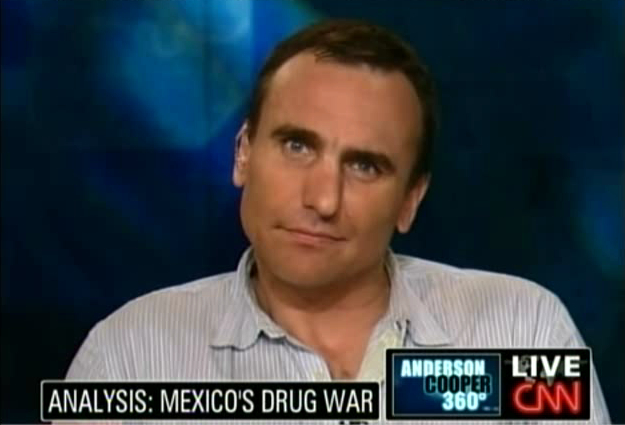AC: "Unfortunately...there's no ready-made answer."
Thursday, May 28, 2009

Length: 4:54
LARGE (57.0 MB) ----- SMALL (6.0 MB)
Michael updates the latest from the Mexican drug war. First, a VO looking at a daring prison break (accomplished with the help of corrupt law enforcement personnel) and at the overall toll the cartels are exacting upon the local population; followed by a Q&A with John King (guest-hosting from DC.)
JOHN KING: Tonight, a troubling new development in "The War Next Door."
Mexico has vowed to crush the murderous drug cartels. And President Obama has pledged hundreds of millions of dollars to help. But is it enough to stop the violence and keep it from spreading across the border?
As Michael Ware found out, the suspects aren't just foot soldiers and smugglers; they're also public servants and mayors.
Here's Michael's report and analysis.
(BEGIN VIDEOTAPE)
MICHAEL WARE, CNN CORRESPONDENT (voice-over): Watch closely to what you're about to see. It's incredible -- grainy security camera video at a prison in Mexico.
Heavily-armed and obviously well-trained federal police appear to be sweeping in to transfer maximum-security prisoners. But this is not what it looks like, for these men are not police. Fake police officers arrived in this convoy, their uniforms legitimate, their cars marked as cop cars. And within two minutes and 55 seconds, they had scooped up 53 inmates, stolen 23 guns, and driven back out the gate and away.
Of the 53 prisoners freed, at least 12 were cartel members. And why many of the 53 were in that cell block that night is a mystery, as they were meant to have been held elsewhere. Later, 44 prison guards were questioned.
When we patrolled neighborhoods in Juarez with Mexican police, we knew corruption is a deeply entrenched way of life here. The corruption is so bad, honest officials don't know who to trust. After all, just this week, federal police arrested ten mayors of Mexican cities and 17 other officials. They charged them with corruption.
And it's the latest escalation in the 2 1/2-year war, a war that has seen President Felipe Calderon put 45,000 troops into battle against the cartels, and it's a war that has so far taken the lives of 7,499 people.
Most of the dead were cartel foot soldiers, but many were innocent Mexican civilians caught in the cross fire. And a few Americans have been killed, as well.
When we visited the war's front lines in Juarez, right next to the Texas city of El Paso, we found the story of this mother of two. Marisela Molinar, a U.S. resident. Murdered, gunned down within yards of the El Paso border crossing as cartel assassins targeted her boss, who was sitting beside her.
Now another American is dead, this time a 15-year-old high school student. She died while sitting with her family at a baptism party in Juarez. She was cut down by a stray round from a firefight that swept past the house.
All this bloodshed, and for what? A war U.S. and Mexican law enforcement officers agree cannot be won. At least not the way it's being fought now. A war fueled by America's appetite for drugs and one commonly waged by cartel members with U.S. weapons in their hands smuggled south across the border.
(END VIDEOTAPE)
KING: Michael Ware with us now.
Michael, horrific and depressing reporting there. So you were there. If nobody trusts anybody, what do the officials you talked to say needs to happen to win?
WARE: Well, unfortunately, John, there's no ready-made answer. I mean, even if you probe these officials -- and they're in such a predicament, John. I mean, I was in the police headquarters of Juarez, the police headquarters itself, the command center, and there were officers there who couldn't talk to me in front of the other officers, or factions who couldn't talk in front of others.
And indeed, when I was talking to someone from the Mexican president's office in Juarez, I was told an anecdote where a crackdown on a stolen car ring resulted in a firefight between Mexican police and Mexican army over who would get to steal the cars. So that's the nature of the problem we're talking about, just on the corruption front. Let alone the organization, sophistication of the cartels, the support within the people, the improbability of the terrain. It all adds up to the fact that there's no quick fix here.
The two most readily obvious extremes are: the first, you cut down the demand. Legalize these drugs in America, and that immediately evaporates the need for organized crime to provide them.
Either that or: we see 45,000 Mexican army troops in the field. You can militarize the American border, send the 101st Army Division into Juarez...but no one wants to see that either. There's no quick fix, mate.
KING: No quick fix and some depressing reporting there, Michael. Michael Ware, thanks so much.
WARE: Thanks, mate.
